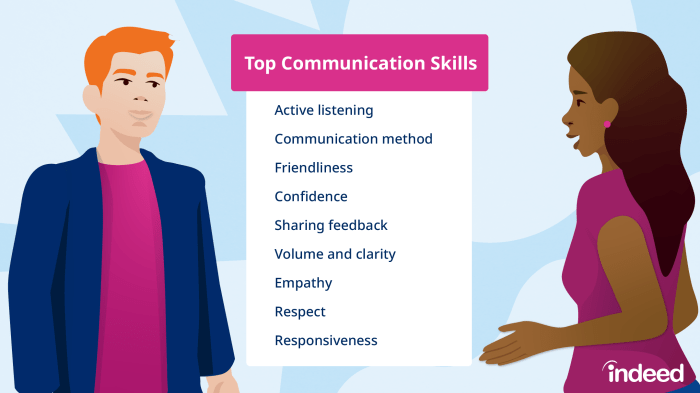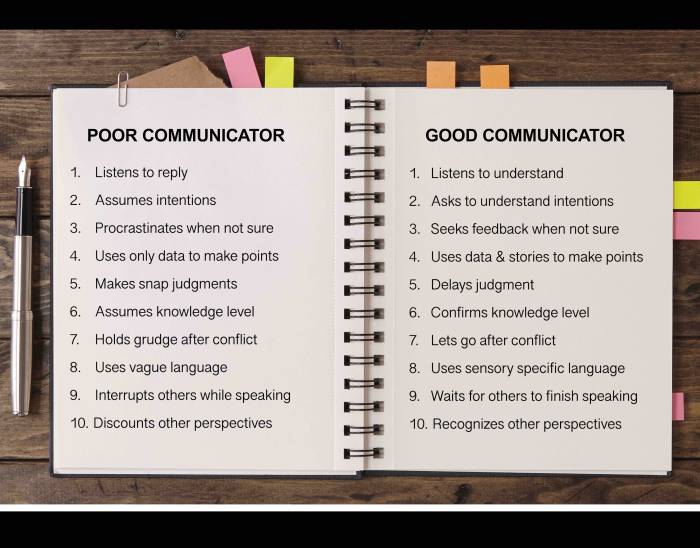Effective Communication Skills set the stage for success in both personal and professional realms. From building strong relationships to boosting productivity, these skills play a crucial role in every interaction we have.
As we delve deeper into the key elements and strategies for enhancing communication, you’ll discover how mastering this art can truly transform the way you connect with others.
Importance of Effective Communication Skills

Effective communication skills play a vital role in both personal and professional settings. They are essential for building strong relationships, fostering teamwork, and increasing productivity.
Impact on Relationships
Good communication skills help in expressing thoughts and emotions clearly, leading to better understanding and empathy. This can strengthen relationships, whether with friends, family, or romantic partners.
Role in Teamwork
In a professional environment, effective communication is key to successful teamwork. Clear communication ensures that tasks are completed efficiently, and everyone is on the same page regarding goals and expectations.
In Conflict Resolution and Problem-Solving
Communication skills are crucial in resolving conflicts and finding solutions to problems. By effectively expressing concerns and actively listening to others, individuals can work together to address issues and reach mutually beneficial outcomes.
Key Elements of Effective Communication
Effective communication involves several key elements that are essential for conveying messages accurately and building strong relationships. These elements include active listening, clarity, empathy, nonverbal communication, tone, body language, and word choice.
Active Listening
Active listening is a crucial element of effective communication where you fully concentrate on what is being said, understand the message, and respond thoughtfully. It involves giving the speaker your full attention, asking clarifying questions, and providing feedback to ensure mutual understanding.
Clarity
Clarity in communication means expressing your thoughts and ideas in a clear and concise manner, avoiding ambiguity or confusion. Using simple language, organizing your thoughts logically, and being direct in your communication helps to convey your message effectively.
Empathy
Empathy is the ability to understand and share the feelings of others, putting yourself in their shoes to see things from their perspective. By showing empathy in communication, you build trust, strengthen relationships, and demonstrate that you care about the other person’s emotions and experiences.
Nonverbal Communication
Nonverbal communication plays a significant role in conveying messages accurately, as it includes gestures, facial expressions, posture, and eye contact. Paying attention to nonverbal cues can help you interpret the feelings and intentions behind the words spoken, enhancing the overall understanding of the message.
Tone, Body Language, and Word Choice
The tone of voice, body language, and word choice used in communication can greatly influence how the message is perceived by the receiver. A friendly tone, open body language, and positive word choice can create a welcoming atmosphere and encourage effective communication, while a harsh tone, closed-off body language, and negative word choice can lead to misunderstandings and conflicts.
Developing Effective Communication Skills

Effective communication skills are crucial for success in various aspects of life, including personal relationships, academic pursuits, and professional endeavors. Developing these skills requires practice, patience, and a willingness to learn and adapt. Below are some key strategies to enhance your communication skills:
Improving Active Listening Skills
Active listening is a fundamental component of effective communication. To improve your active listening skills, consider the following tips:
- Give the speaker your full attention by maintaining eye contact and avoiding distractions.
- Show empathy and understanding through nonverbal cues such as nodding and facial expressions.
- Ask clarifying questions to ensure you have understood the speaker’s message correctly.
- Reflect on what was said by paraphrasing or summarizing key points.
Enhancing Clarity and Conciseness in Verbal and Written Communication
Clear and concise communication is essential for conveying your message effectively. To improve clarity and conciseness, consider the following tips:
- Organize your thoughts before speaking or writing to ensure a logical flow of information.
- Avoid jargon and technical language that may confuse your audience.
- Use simple and straightforward language to express your ideas clearly.
- Edit and revise your written communication to eliminate unnecessary words and ensure clarity.
The Importance of Feedback in Developing Effective Communication Skills
Feedback plays a crucial role in improving your communication skills. Here are some reasons why feedback is essential:
- Feedback provides insights into how your message is being received by others.
- Constructive feedback helps you identify areas for improvement and adjust your communication style accordingly.
- Feedback fosters continuous learning and growth, allowing you to refine your communication skills over time.
- Seek feedback from trusted sources, such as mentors, peers, or communication experts, to gain valuable insights and perspectives.
Barriers to Effective Communication
Effective communication can face several barriers that hinder the exchange of information and ideas between individuals or groups. These barriers can range from language differences and cultural barriers to distractions and emotional factors that affect the clarity of communication.
Language Barriers
Language barriers can arise when individuals speak different languages or have different levels of proficiency in a common language. This can lead to misunderstandings, misinterpretations, and difficulties in conveying complex ideas effectively.
Cultural Differences
Cultural differences can impact communication by influencing the way individuals perceive and interpret messages. Different cultural norms, values, and communication styles can result in misunderstandings and conflicts if not properly addressed.
Distractions
Distractions such as noise, interruptions, or technological devices can interfere with effective communication. These distractions can disrupt the flow of conversation, cause misunderstandings, and hinder active listening.
Emotions and Assumptions
Emotions and assumptions can also act as barriers to effective communication. Strong emotions like anger, fear, or stress can cloud judgment and lead to reactive responses instead of thoughtful communication. Assumptions and biases can create barriers by influencing how messages are perceived and interpreted.
Strategies for Overcoming Communication Barriers, Effective Communication Skills
To overcome communication barriers in diverse environments, individuals can employ strategies such as active listening, seeking clarification, adapting communication styles to fit the audience, and practicing empathy and cultural sensitivity. By addressing these barriers proactively, individuals can enhance their communication skills and foster better understanding and collaboration in various settings.